The demand for mental health care continues to rise faster than the number of available practitioners. According to the American Psychological Association, 53% of psychologists reported they were not accepting new patients.
Fortunately, digital technology is changing the way psychologists work. Mental health tools now support every part of your workflow, from automating report creation and note-taking to enabling virtual therapy sessions.
These platforms help you serve more clients without sacrificing the quality of care. For patients, they offer flexible access, faster follow-ups, and ongoing mental health support between sessions.
Below, we'll list the best mental health technology tools for psychologists. Whether you run a private practice or work in a clinic, these platforms can improve how you deliver mental health services.
1. Psynth – Best for AI-Assisted Report Writing
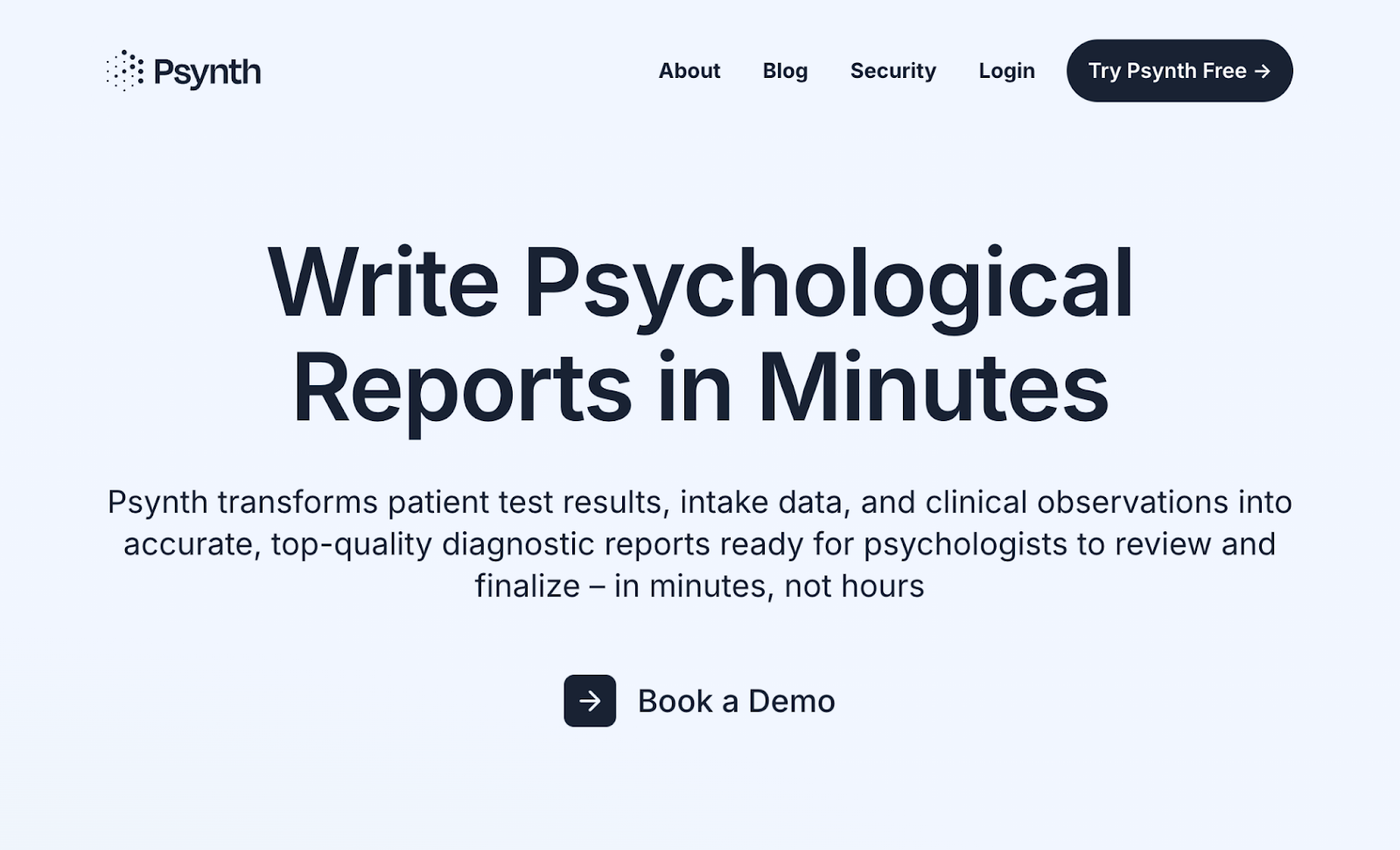
Report writing is one of the most time-consuming parts of any psychological practice. Artificial intelligence (AI) technology now makes this task easier.
Psynth offers an AI-enabled report writing platform created by psychologists for psychologists. It quickly turns patient test results, intake data, and clinical observations into structured, high-quality diagnostic drafts. What used to take several hours is now completed in less than 45 minutes.
Every draft follows up-to-date best practices in psychological reporting. It also includes input from practicing psychologists and psychometrists to ensure accuracy.
With Psynth, you also receive evidence-based findings and clear explanations for smarter clinical decisions.
However, you retain full control over the final output. Use your own words or AI-assisted prompts to tailor the report to your voice, preferences, and clinical needs.
The platform supports 370+ assessments, automates quality checks, and flags formatting inconsistencies. This significantly reduces the time spent on paperwork, giving you more time for the diagnosis of mental health conditions.
For data security, Psynth offers end-to-end HIPAA compliance. It encrypts all information using hardened AWS cloud infrastructure that exceeds HIPAA requirements. No data is ever stored, cached, or repurposed in their large language models (LLMs).
Psynth also maintains a Business Associate Agreement (BAA) with your psychology practice. This gives you peace of mind, knowing that protected health information (PHI) remains safe and confidential.
If you're seeking AI technology to replace your work, Psynth isn't that. It simply manages the time-consuming parts of report writing, while you handle the assessment and clinical analysis.
Key Features
Psynth's psychological reporting software offers the following features:
Seamless Data Intake
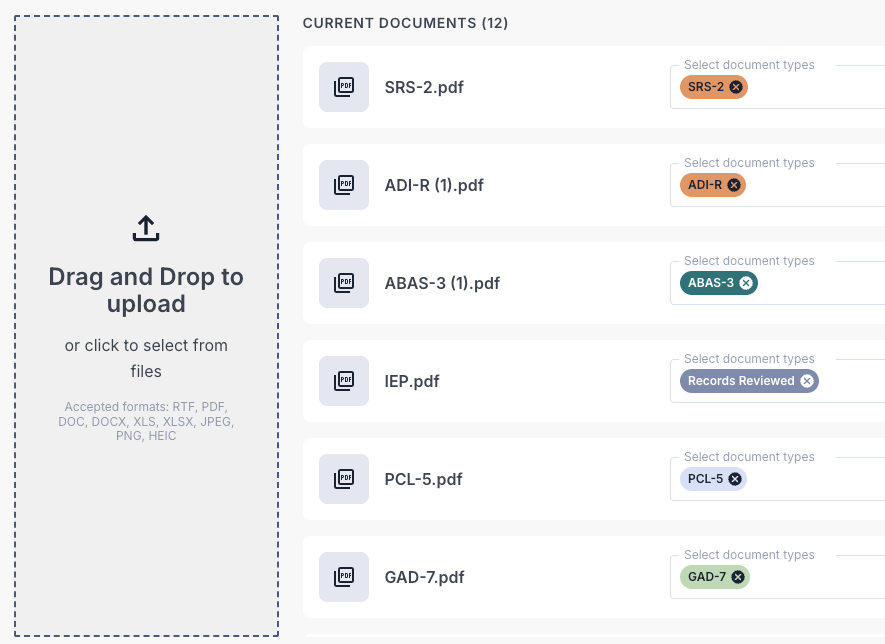
Upload test results, intake data, interview data, and other clinical information directly into Psynth. The software automatically reads any file (PDFs, images, or handwritten notes) and organizes it without requiring formatting.
This eliminates the need for multiple tools or manual data entry. All your data is processed within minutes.
In fact, the team at Psychology Specialists of Utah, led by Dr. Chuck Edgington, used to rely on several tools before adopting Psynth. By unifying the reporting process within a single AI-assisted platform, Psynth simplified the operations for this multi-clinician practice.
Fast, Accurate Report Generation
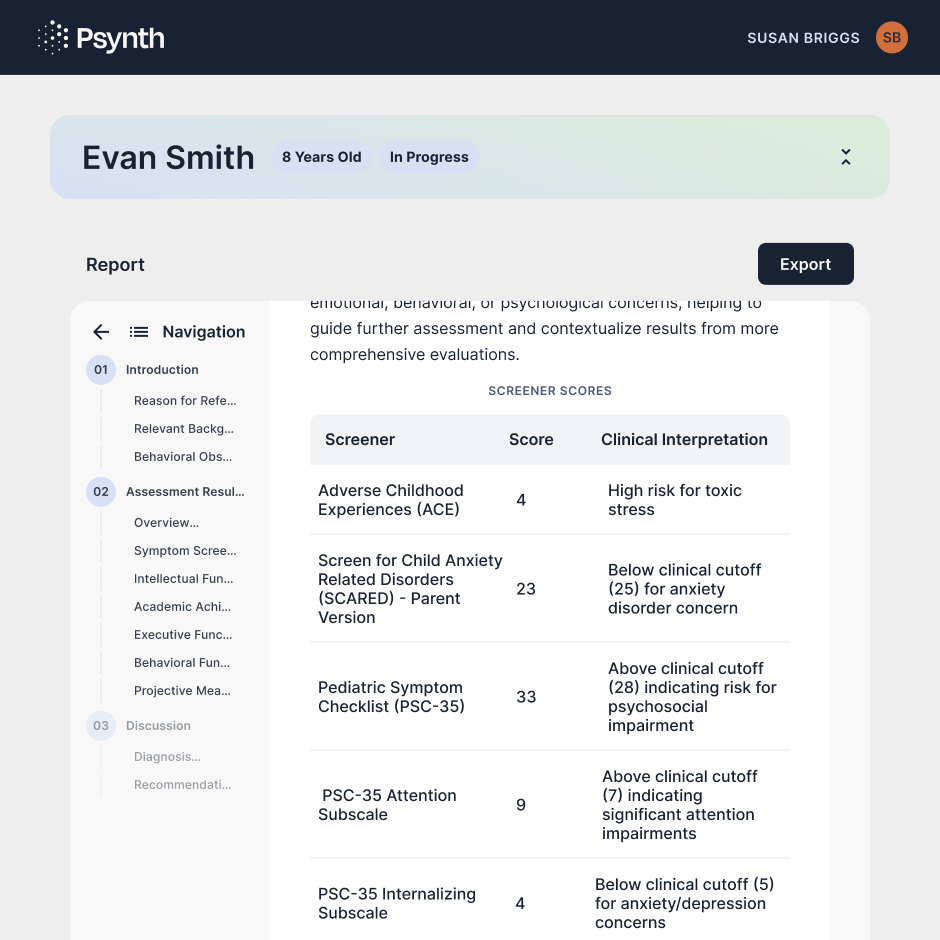
Psynth creates comprehensive, PhD-smart reports in less than 45 minutes. It uses AI technology built on validated, up-to-date best practices in psychological reporting.
Each report has clear descriptions and easy-to-read data visuals designed to improve patient understanding.
The software also runs automatic quality control checks to verify data accuracy. If any inconsistencies or missing details appear, Psynth flags them for your review before finalizing the report.
Check this case study to learn how Coast Psychology cut report time in half using Psynth.
Fully Customizable Reports
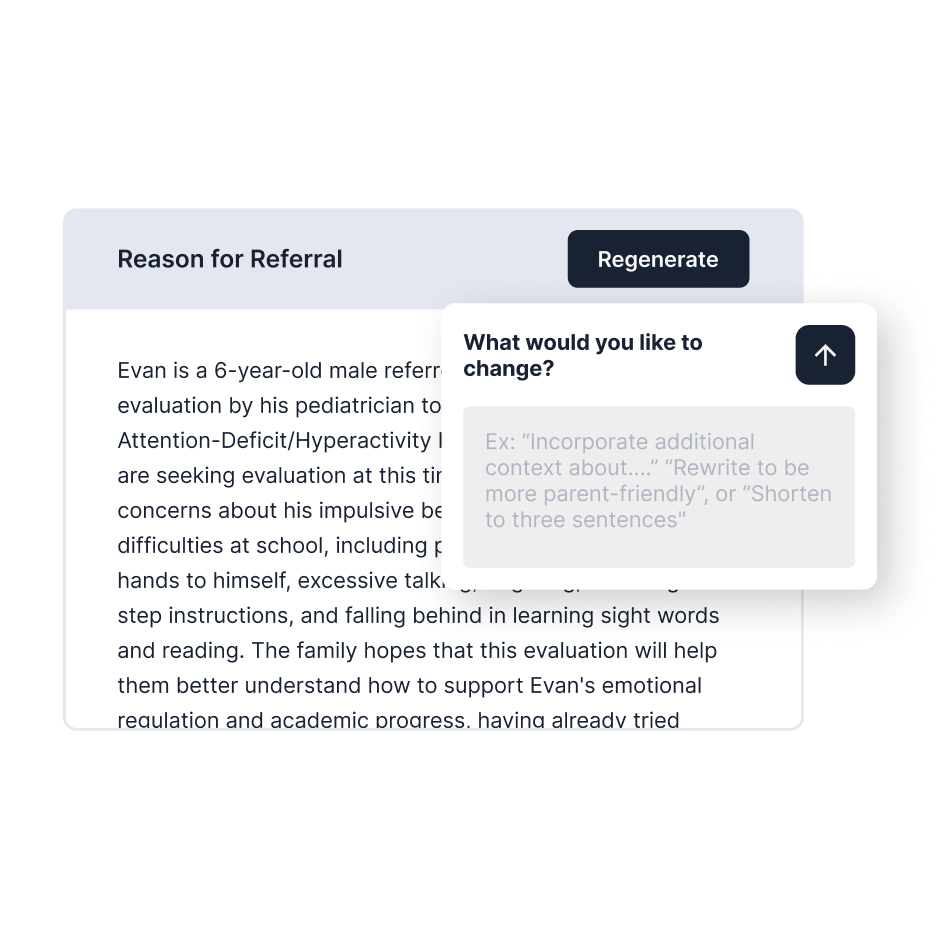
With Psynth, you can tailor diagnostic reports to match your personal writing style and clinical approach. Edit any section using AI-assisted prompts or manual input.
Formatting changes to the draft appear in real time, which can make revisions quick and intuitive.
Built-In Assessments
Psynth supports 370 (and counting) standardized psychological assessments, including WISC, BASC, and Vineland.
It’s built around the tools you already use, which helps automate your reporting workflow.
AI-Assisted Diagnosis
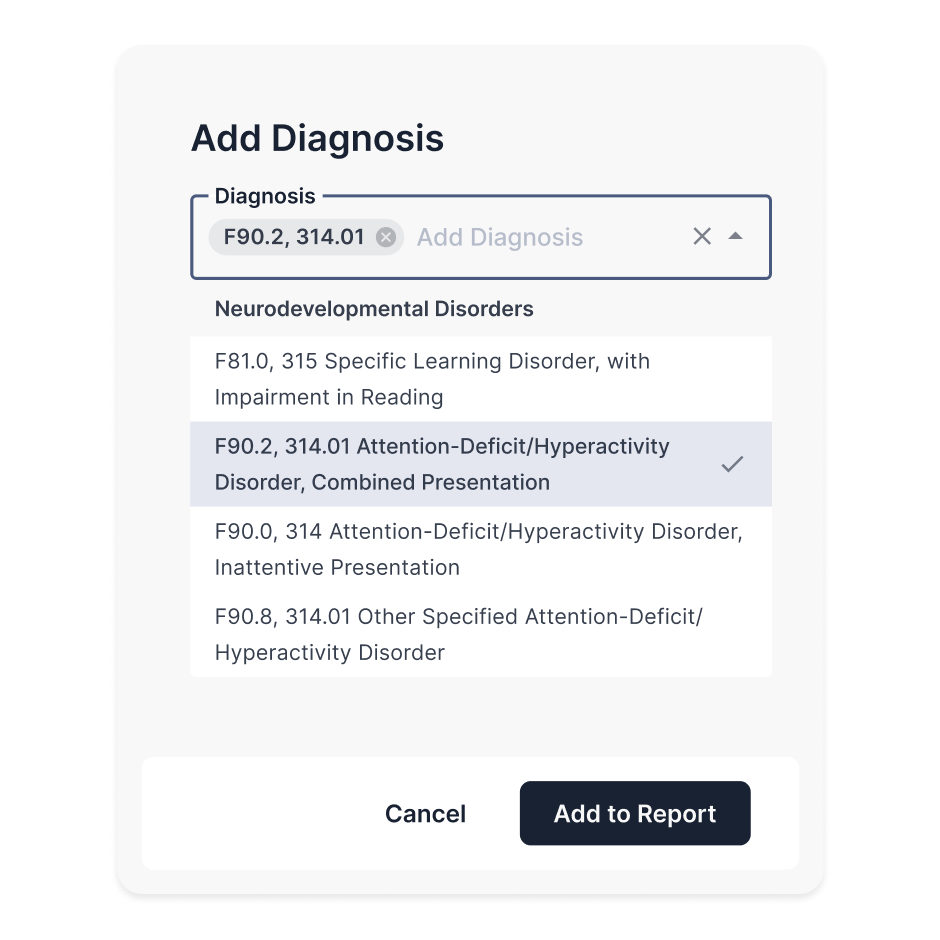
The AI offers evidence-based insights and clear explanations that support, not replace, your clinical judgment. You remain in control of all final interpretations.
One-Click Export
After finalizing your draft, save your diagnostic reports instantly to Word (.docx file) and share them with clients.
Psynth's one-click export tool helps you move from assessment to action without compromising your clinical voice.
End-to-End HIPAA Compliance
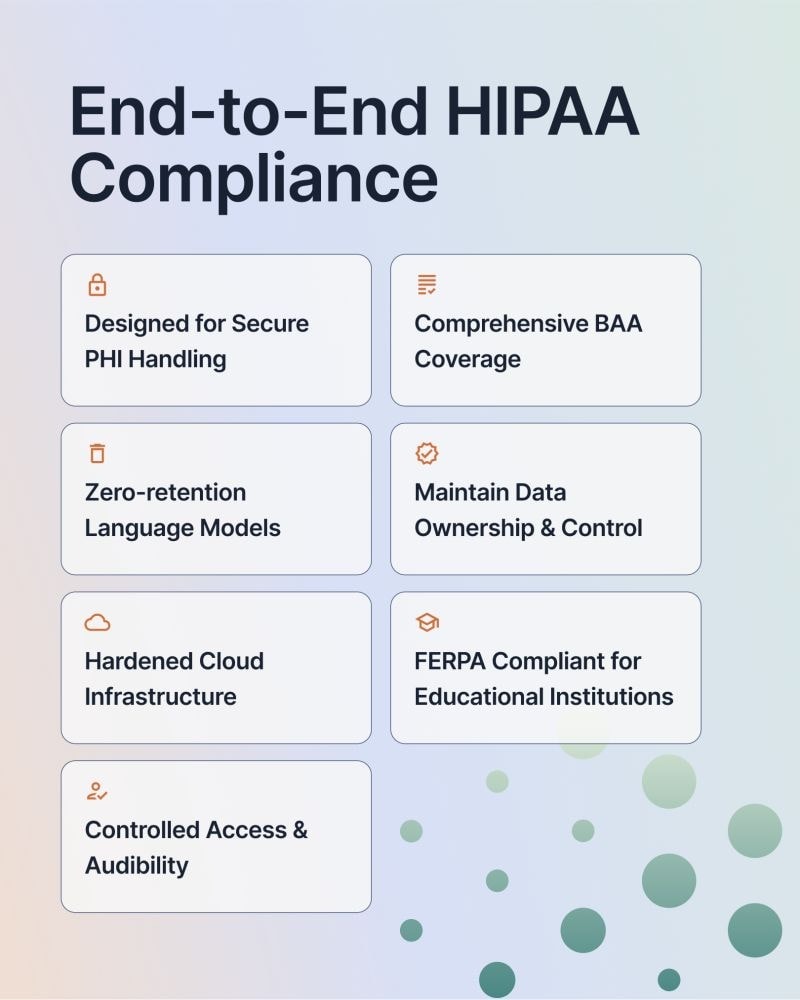
Psynth's AI-powered report writing software ensures data privacy and security. The platform is fully HIPAA-compliant with a signed BAA. It also encrypts data using AWS cloud infrastructure that undergoes continuous monitoring.
It even includes zero-retention language models, meaning no patient information is stored or reused. Your data remains exclusively yours.
Request a demo of Psynth today to write reports faster without compromising data security!
2. Heidi – Best for Automating Clinical Notes
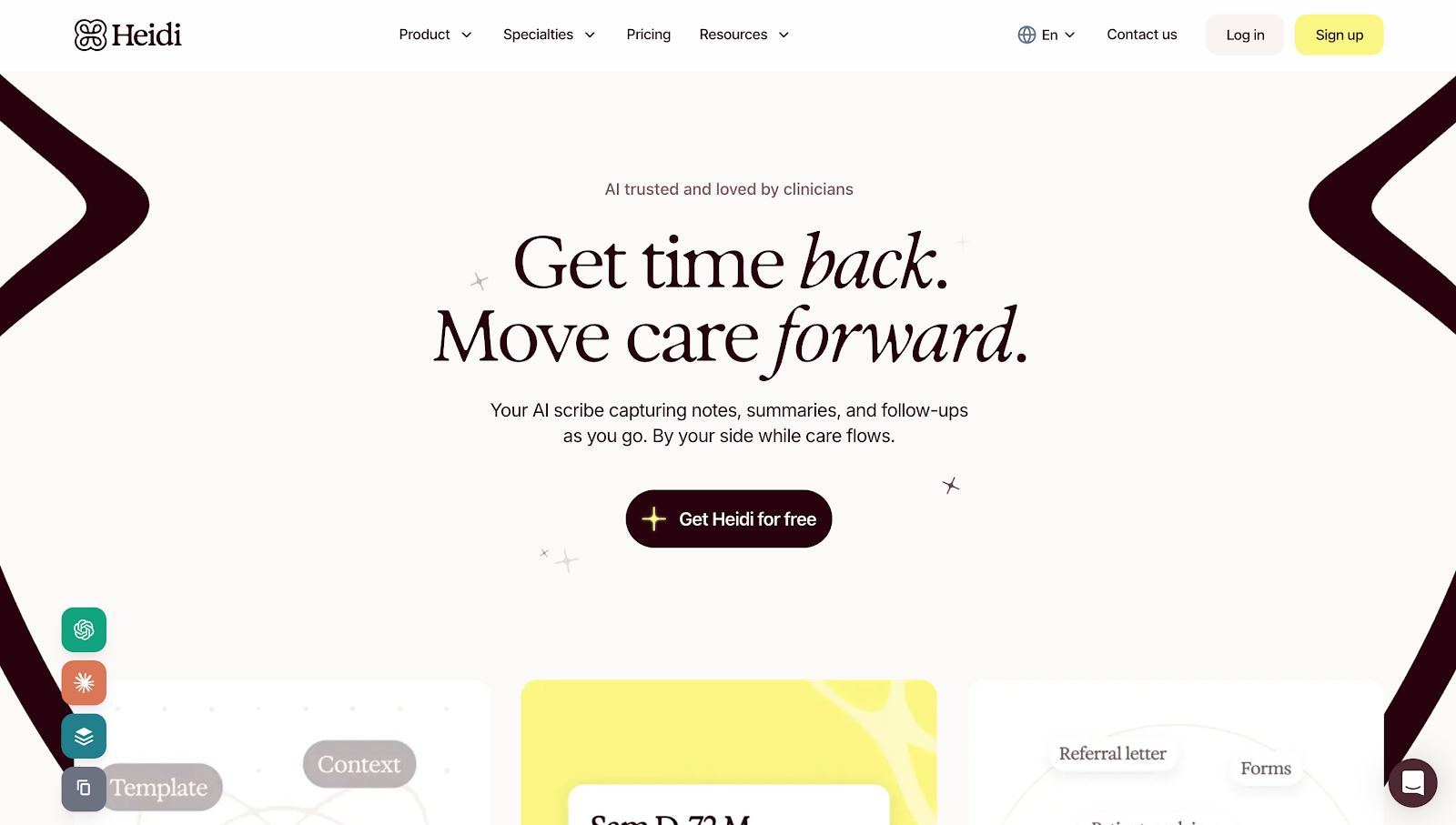
Taking notes during a session can pull your attention away from your patient. Heidi changes that by automating note-taking, so you can focus on the person in front of you instead of your keyboard.
Heidi is an AI medical scribe designed for psychologists, licensed therapists, and other mental health professionals.
It uses ambient listening technology to listen to your sessions, transcribe the conversation, and turn it into complete clinical notes.
The platform can generate SOAP, DAP, and narrative summaries within seconds. It also creates follow-up plans, referral letters, and handouts in your patient's preferred language, while you write in yours.
Heidi even learns your clinical style as you go. It ingests any contextual information you added to tailor the report to the client.
After the consultation, Heidi connects to leading electronic health record (EHR) systems with a single click. This lets you review and send clinical notes without extra steps.
Key Features
- Real-time transcription and dictation: Heidi listens and transcribes your sessions, keeping track of what’s said so you can stay focused on your client. The platform filters background noise to capture clear audio and translate accurately.
- Document generation: Write referrals, discharge notes, or instructions in the style or language your audience needs.
- Built-in templates: Choose from pre-loaded templates to start with SOAP, DAP, or custom formats that fit how you work. Alternatively, convert a previous note, build one from scratch, or get inspiration from what Heidi's online community uses daily.
- Admin support: Ask Heidi to take care of administrative tasks so you can focus on mental health treatment instead of documentation.
- Customization options: Set shortcuts to match your clinical workflow. You can also use your preferred terms, abbreviations, and fixes.
- EHR integration: Heidi sends completed notes to your EHR with just a click.
- Enterprise-grade security: The platform complies with HIPAA, GDPR, NHS, and SOC 2 standards. It instantly deletes identifiable details from your transcript and notes to ensure patient privacy.
3. Doxy.me – Best for Telepsychology and Virtual Sessions
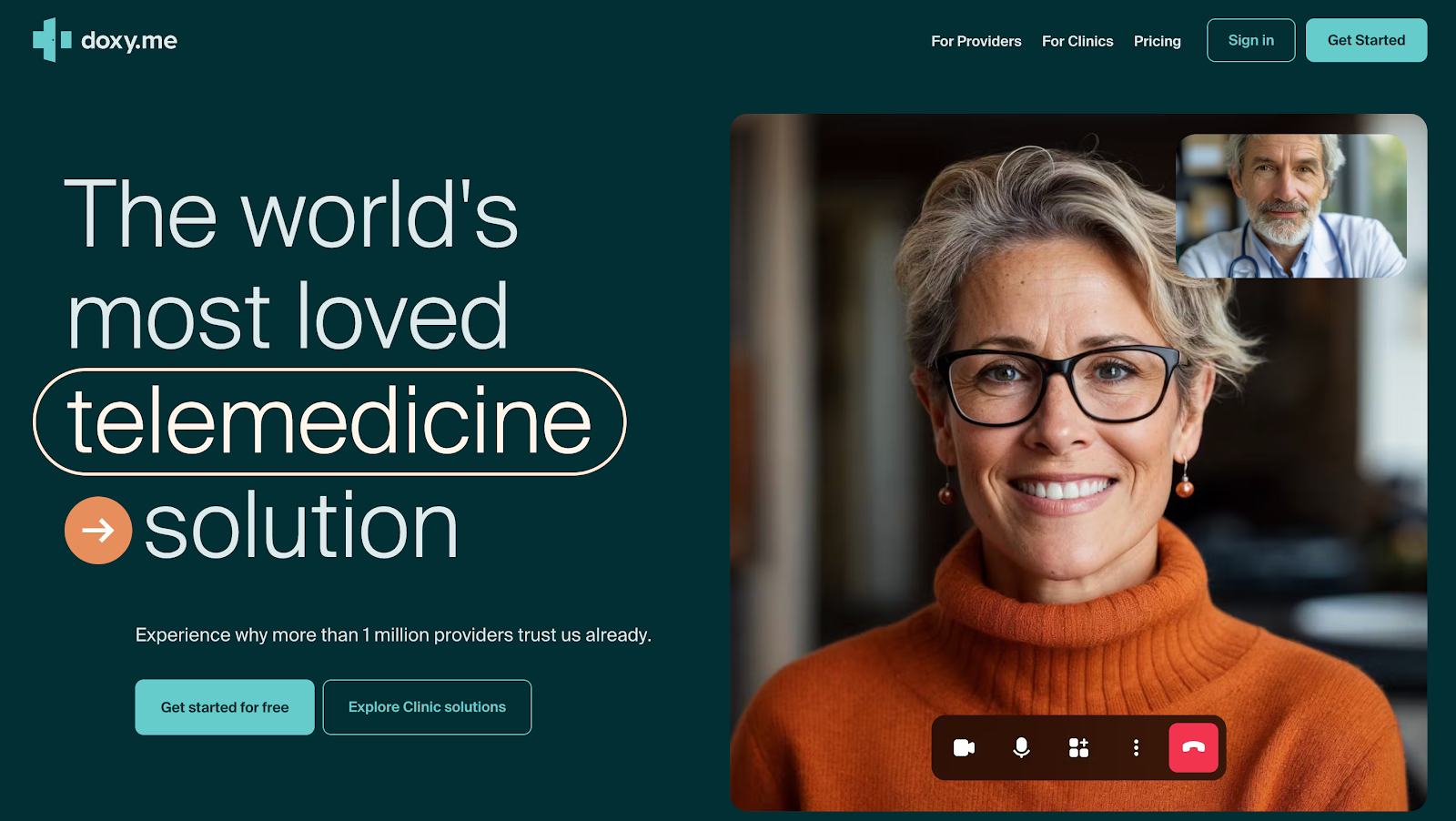
Teletherapy technology like Doxy.me allows you to provide mental healthcare to clients anywhere, especially in remote or underserved areas.
Doxy.me offers a browser-based telehealth platform designed for online therapy and digital health delivery. It works without downloads for either you or your client. Simply send a link to your personal waiting room.
Doxy.me lets you tailor your online space with content, images, and videos. This ensures your psychology practice looks professional, while patients feel confident that they are in the right place.
Virtual sessions run in encrypted HD video to provide a secure, smooth experience for clients. Meanwhile, the built-in chat enables you to communicate with patients by text, even if you're on another call.
Doxy.me even tracks the date, time, and duration of every session for documentation, billing, and insurance purposes.
Key Features
- Browser-based teleconsultations: Host online sessions directly in your web browser without needing to download the app or install plugins. It's easy for clients to get started, especially in areas with limited access to mental health resources.
- High-quality video and audio: Sessions use HD video and clear audio to provide emotional support and clinical connection during remote care. This recreates the feel of in-person consultations even from afar.
- Built-in chat: Send messages, links, or resources to your clients while you're on a video call with another patient.
- Custom waiting room: Personalize your virtual waiting room with images or messages so clients feel at ease before their session starts.
- Patient queue: The platform shows when your next client has checked in, enabling you to manage back-to-back sessions and reduce downtime.
- Meeting history: Every session’s date, time, and duration are logged automatically. Doxy.me doesn't store personal data or protected health information.
- End-to-end encryption: All chat messages and video calls are encrypted. Everything is also subject to 24/7 continuous monitoring to ensure early detection of security breaches.
4. Jane – Best for Practice Management

If you spend more time on administrative tasks than on your patients, technology for practice management becomes a game-changer. It frees up your valuable time for more impactful work.
Jane is built for psychology practices, healthcare providers, and solo practitioners who want a single platform for scheduling, billing, note-taking, and analytics.
It integrates online booking, charting, scheduling, and invoicing into a unified mental health app. This eliminates the need for multiple systems, empowering you to manage everything in one dashboard.
Jane also includes telehealth options, which help you provide one-on-one virtual sessions. It offers a waiting room, in-call chat, screen share, and control over the client's camera and microphone participation.
The platform even has AI tools that can instantly transform recorded or dictated sessions into clinical notes. It organizes your documentation in the background, while you stay focused on addressing the client's mental health concerns.
Key Features
- Online booking: Jane lets your clients book appointments directly through your website. This eliminates the need to manage every booking while giving clients easy access to mental health services.
- Staff scheduling: Assign appointments online or in person, manage your team's shifts, create waitlist requests, and switch between location schedules with a single click. It works whether you’re a solo practitioner or managing a multi-clinician psychology practice.
- Payment processing: Generate invoices, accept payments via cash, card, or e-Transfer, and send receipts in one platform.
- Billing and insurance management: Collect insurance policies, generate invoices, and contact your patients' insurers through seamlessly integrated insurance billing workflows.
- Telehealth tools: Deliver mental healthcare and professional advice online through Jane's 1:1 virtual sessions. The built-in waiting room, chat, and screen sharing features provide a seamless experience for patients.
- AI scribe: Use Jane’s AI tool to create session summaries, intake notes, and treatment plans faster.
- Reports and analytics: Generate insights on bookings, revenue, client trends, and cancellation rates. These data help you make informed decisions about your psychology practice.
5. eMoods – Best for Mood and Symptom Tracking

Tracking mood patterns and early signs of relapse helps you provide better care for clients dealing with mental health issues or mental disorders. Mood-tracking technology like eMoods lets your clients log data between sessions and bring meaningful progress to your therapy work.
eMoods allows your patients to record daily highs and lows, sleep problems, medications, and other relevant data related to mood disorders.
After collecting data, the platform generates easy-to-understand visual graphs that clients can send to you. These help you understand the patient's mood changes and potential triggers, so you can adjust your treatment approach.
Meanwhile, a detailed calendar visualizes patterns or current trends to get a bird's-eye view of the client's mental well-being.
eMoods also connects to local weather, daylight, and moon phases. This lets you see how much outside influences affect your client's moods and other symptoms of mental health disorders.
The mental health app is designed to enhance traditional therapy by giving you objective insights rather than relying only on client recall.
Key Features
- Mood and symptom diary: eMoods allows your clients to track daily highs and lows, sleep patterns, and other symptoms linked to mental illness or psychiatric disorders. This diary provides better insights during sessions.
- Medication tracking tool: Clients can log when they take medication and organize it by time of day, daily, or as needed.
- Email reports: Patients can send a summary report directly to you or save it for therapy sessions. This improves communication and helps you assess patient progress between visits.
- Configurable graphs: View visual charts that plot mood, sleep, medications, and triggers side-by-side. These easy-to-understand graphs help you identify early signs of change and link factors in mental disorders.
- Detailed calendar: A calendar view gives a bird’s-eye view of mood patterns, sleep, medication, and symptoms over weeks or months. This helps identify trends that might support systematic review of treatment.
- Weather integration: The app integrates weather, daylight, and moon-phase data so you can see how external factors might affect mood shifts.
- Automated reminders: Patients receive reminders to log moods, take medication, or fill out their charts. These prompts ensure consistent tracking and improve data quality to support your psychological reports.
6. PsyPack – Best for Psychometric Testing
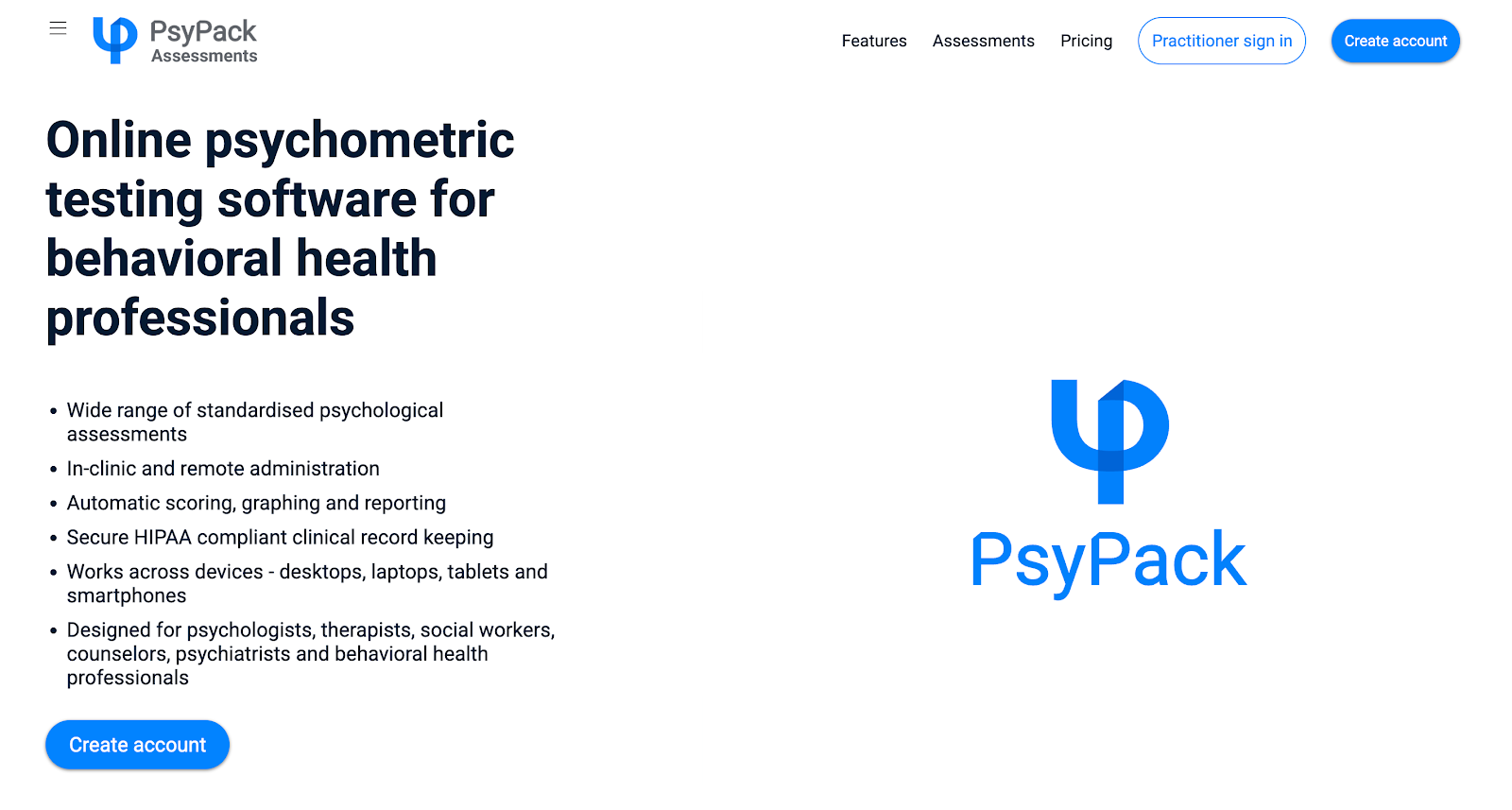
Psychometric testing technology provides faster, more accurate assessment data so you can better tailor treatment for clients with mental health problems.
PsyPack is for psychologists who want to assess, score, and monitor clients with efficiency and clarity. It offers a large library of standardized assessments for mental health conditions like depression, anxiety, and PTSD.
It's easy to get started with PsyPack. Simply select a test from their library and enter the client's email address to initiate the assessment. The patient can take the test in your office or remotely on any device (mobile, tablet, laptop, or desktop).
Once the assessment is complete, the platform instantly handles scoring, graphing, and report generation.
Key Features
- Comprehensive assessment library: PsyPack offers a large collection of standardized psychological tests, including the Center for Epidemiological Studies Depression - Revised (CESD-R) and the World Health Organization Disability Assessment (WHODAS 2.0). It provides the necessary tools to evaluate a wide range of mental disorders and treatment needs.
- Seamless test administration: Starting an assessment only takes three clicks, and you can send it to the client remotely or administer it in-clinic with ease.
- Multi-device compatibility: You and your clients can access assessments via a desktop, tablet, or mobile phone.
- Interpretive reports: The platform generates detailed reports that include graphs, severity coloring, and subscale vertex shapes.
- Custom notes and recommendations: After the automated scoring, you can add your own clinical commentary, tailor recommendations, and make sure each report reflects your professional voice.
- One-click export: Download and share reports as a PDF file with just a click.
- Population-level analytics: PsyPack gives you insights at the group level, allowing you to gain localized norms for your community.
7. PsyTech VR – Best for Exposure Therapy
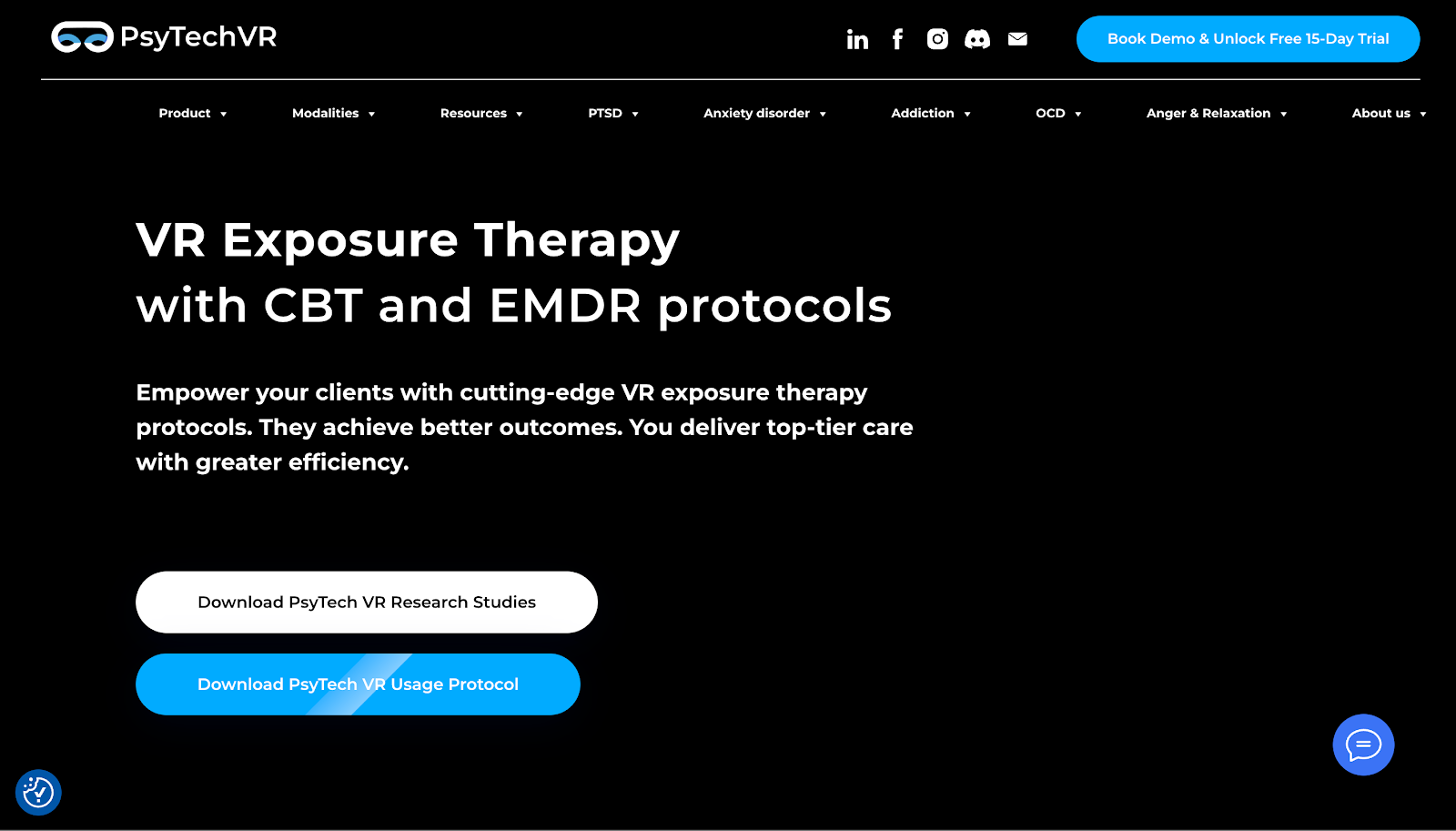
Virtual reality technology brings exposure therapy to life by offering immersive environments where clients can safely face triggers and fears under your guidance.
PsyTech VR is for psychologists and mental health care providers who want to provide innovative, high-engagement treatments either in-clinic or remotely.
This advanced VR platform includes a large therapy library of immersive scenarios to treat anxiety disorders, PTSD, OCD, addictions, anger, and stress.
Alternatively, the built-in AI module lets you create exposure scenarios to improve mental health outcomes and support overall mental well-being.
PsyTech VR also includes a launchpad to control the virtual reality therapy. Meanwhile, the integrated biosensors help you monitor critical health metrics in real time during sessions.
On top of these capabilities, the software consolidates data from each VR session. This lets you see the history of VR therapy, fear/stress assessments, session duration, and other details.
Key Features
- VR therapy library: PsyTech VR offers immersive therapy content to support PTSD, anxiety, anger, OCD, and addiction treatment.
- AI module: Use the AI tool to create exposure scenarios tailored to specific patients.
- VR launchpad: Access a control center where you guide the client's VR experience live. Choose a scenario, monitor responses, and switch levels or safe spaces instantly.
- User-friendly biosensors: Integrated biosensors track key physiological indicators during VR sessions so you can monitor stress or relaxation levels in real time.
- Reporting dashboard: The platform logs session data, collects the patient's assessment, and generates training analytics.
- Learning management system: PsyTech VR includes training modules and implementation guides for you and your staff. This helps you integrate VR therapy into your psychological practice with professional support.
- Automated CBT questionnaires: Built-in questionnaires and protocols help measure baseline, post-session, or follow-up states.
Other Types of Digital Mental Health Technology in Psychology
Aside from the tools above, psychologists can also use other forms of technology to support mental healthcare and improve health outcomes for clients.
Wearable Devices
Wearable devices like smartwatches and fitness trackers help psychologists monitor clients’ behaviors outside sessions. These tools collect data on sleep, heart rate, physical activity, and stress levels.
Psychologists can use these insights to track progress or detect early signs of anxiety or burnout that may lead to mental health problems.
Digital Therapeutics
Digital therapeutics are clinically validated apps that deliver structured treatments for mental health conditions like depression, insomnia, or anxiety.
These tools often use evidence-based approaches, such as CBT or mindfulness. They are designed for patients who want ongoing support between appointments.
For psychologists, digital therapeutics can reinforce therapy goals and track progress over time. Many platforms use machine learning algorithms to adapt interventions based on user behavior. This creates a personalized experience that supports both prevention and relapse management.
Email Communication Tools
Email communication tools help psychologists maintain professional contact with clients outside sessions. They allow secure follow-ups, check-ins, and the sharing of mental health resources or reminders.
Practitioners can send progress forms, coping exercises, or feedback summaries to patients who prefer asynchronous communication or live far away.
Community and Support Platforms
Online community platforms provide safe spaces for clients to connect, share experiences, and offer peer support. These platforms can be moderated by mental health professionals or used as complementary spaces to therapy.
They are especially beneficial for people who feel isolated or hesitant to seek in-person help. That's because sharing personal stories helps clients realize they’re not alone, which improves community belonging.
For psychologists, these platforms can supplement treatment by building accountability and social connection outside the office. They empower clients to raise concerns or apply coping strategies learned in therapy.
AI Chatbots
AI chatbots are virtual assistants that offer basic mental health support, education, and crisis resources. They simulate conversation through text or voice to provide emotional support or guidance in the moment.
Psychologists use mental health chatbots as supportive tools for reinforcing coping skills and monitoring client well-being between sessions for timely interventions.
Psynth's AI Technology Writes Psychological Reports in Minutes

As a psychologist, your time is valuable. Every hour spent writing reports is an hour away from your clients.
Psynth helps you reclaim your evenings and weekends by using AI technology. It turns your test results, intake notes, and clinical observations into high-quality diagnostic reports in minutes. This lets you focus on where you make the most impact: clinical analysis and patient care.
Psynth handles the structure and writing, while you stay in control of the clinical tone and final content. The system also checks for missing data or inconsistencies to ensure your reports are clear and professional.
It even provides evidence-based findings and clear explanations, so you can understand the full picture and make better-informed clinical judgments.
Psynth is also designed to be fully HIPAA compliant. Your data is never stored, cached, or repurposed in their LLMs. Additionally, signed BAAs protect sensitive patient information and prevent unauthorized disclosure.
Try Psynth for free today and complete psychological reports in less than 45 minutes!
FAQs About Mental Health Technology Tools
What are the digital tools for mental health?
Digital tools for mental health include apps, platforms, and software that support therapy, diagnosis, and self-care. These tools are designed to help psychologists address a patient's mental health crisis, track progress, and improve long-term mental health treatment results.
What are mental health technologies?
Mental health technologies refer to digital systems that use data, automation, or telecommunication to support psychological care. They include teletherapy, mood tracking apps, and psychometric reporting tools like Psynth.
What are examples of mental health tech?
Popular examples of mental health technology include Psynth for report writing, Heidi for note automation, and Doxy.me for teletherapy. Each tool supports overall mental health by improving how clients communicate, monitor progress, and stay engaged between sessions.
What are the tools for mental health?
The main tools for mental health include mood tracking apps, AI-assisted reporting platforms, clinical note software, telehealth platforms, and practice management software.



